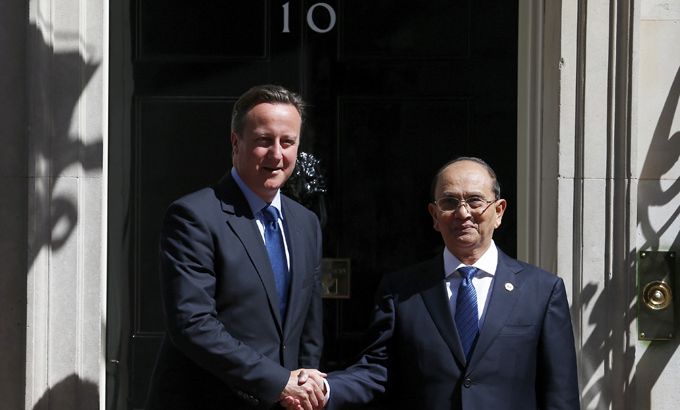Myanmar vows to free all political prisoners
Rights groups oppose Myanmar president Thein Sein’s UK visit, saying he should be held accountable for Rohingya deaths.

The president of Myanmar has promised to release all political prisoners by the end of this year and said he thought a nationwide ceasefire was possible for the first time in six decades.
“By the end of the year there will be no prisoners of conscience in Myanmar,” President Thein Sein told an audience in
London on Monday.
A special committee was reviewing every political prisoner’s case, he added.
Activist had protested his two-day talk with British Prime Minister David Cameron, taking issue with the Asian nation’s human rights record.
About 30 activists from campaign group Avaaz protested outside the British parliament with a banner reading: “Cameron – Don’t let Burma become the next Rwanda”, a reference to the 1994 genocide when hundreds of thousands were killed.
Activists from the Burmese Rohingya Organisation UK as well as Human Rights Watch have also urged Cameron to press Sein on the country’s human rights record.
Sein said in a statement released on his website on Sunday that he had disbanded a security force accused of rights violations against Rohingya Muslims in Rakhine State in the west of Myanmar, scene of deadly violence between Muslims and majority Buddhists in the past year.
Sein was due to talk trade, aid and democracy with Cameron and his ministers at a time when Myanmar is opening up its oil, gas and telecoms sectors to foreign investors, with further liberalisation likely.
Cameron was under pressure to confront Sein over the treatment of Myanmar’s Muslim minority, but faced a tricky balancing act since he has made it clear he wants to expand Britain’s trade links with emerging economies such as Myanmar.
Cameron’s office said it would provide details of the talks later, and a spokesman said the British prime minister had planned to raise human rights.
Sein, a former military commander, is trying to get the West to help Myanmar’s economy recover from decades of military dictatorship, Soviet-style planning and international sanctions.
Western leaders have praised him for ending the house arrest of opposition leader Aung San Suu Kyi, releasing some political prisoners, and allowing the opposition to fight an election.
But they want him to further loosen the military’s grip on the mineral-rich state formerly known as Burma before a 2015 presidential election which the British-educated Suu Kyi hopes to contest. Suu Kyi visited Britain last year.
At least 237 people have been killed in Myanmar in religious violence over the past year and about 150,000 people have been displaced.
Most of the victims were Muslim and the deadliest incidents happened in Rakhine State, where about 800,000 Rohingya Muslims live, according to the United Nations.